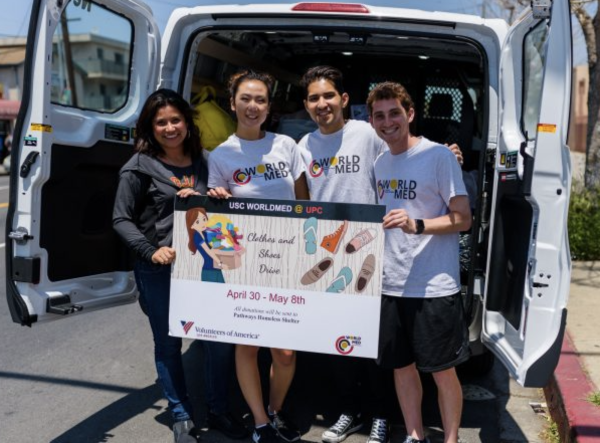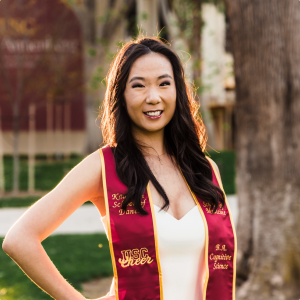(Originally posted at Preventive Medicine.)

From left: Fatima Al-Sarakbi Hernandez, Grace Ryu, Nathan Dhablania, Sammy Cohen at the 2nd Annual Shoe and Clothing Drive in 2018.
By Cristine Hall
When Nathan Dhablania traveled to Panama with Floating Doctors in the spring of his junior year, he noticed that many health disparities abroad existed right here in Los Angeles.
Determined to make a difference after his return, Dhablania teamed up with his good friend and classmate, Sammy Cohen, to found WorldMed@UPC, a student-run organization of undergraduate, graduate and medical students, as well as faculty and staff within the Keck School of Medicine, working to eliminate existing critical health challenges.
“We wanted to make a local impact, especially in the areas of food and housing insecurity, to do things that undergraduates without extensive medical training could actually help with,” said Dhablania, 24, who is now a graduate student adviser for the organization and will enter medical school in the fall after having completed his master’s in stem cell biology and regenerative medicine at USC in 2019. “Health care can’t be limited by geospatial and geopolitical boundaries.”
Dhablania and Cohen were both earning a BS in health promotion & disease prevention when they started WorldMed@UPC in 2017 with a small group of five students. Two of their biggest efforts include a partnership with Monday Night Mission, now Shower of Hope, to provide food to homeless residents of Skid Row, and a shoe and clothing drive that collected items left behind in dormitories, fraternities and sorority houses for Pathways Homeless Shelter.
“This event was meaningful because we worked as a team to make sure we were saying residents’ names as we passed out food to them,” said Dhablania of the Skid Row work. “We take for granted our name, and some residents forget their name—it’s about human dignity.”
Now WorldMed@UPC has grown to include more than 100 student members whose fields of study range from sociology to biostatistics to the arts.
“We didn’t want a cookie-cutter pre-med type of club,” said Cohen, 24, who is now in his first year at Stanford Medical School. “We wanted a club for people interested in giving back to the local community—people from all sorts of backgrounds.”
Elahe Nezami, PhD, who has served as director of health promotion and global medicine programs for more than 20 years, has watched with pride as WorldMed has grown and evolved in the past three years.
“These students are doing important work now, before graduation, and they go on to become top doctors, professors and health professionals,” said Nezami, who is also director of the Master of Science in Global Medicine program at Keck School of Medicine of USC. “They brighten up my life—and the world.”
The group’s activities have escalated to provide education and support during the pandemic, but the members had to adapt their approach with some of them continuing their efforts abroad.
Grace Ryu and Woori Lee took WorldMed@UPC with them when they moved back home to Seoul, South Korea. Ryu, a past president and current graduate student adviser to the group, and Lee, a treasurer pursuing a bachelor’s in human biology, began working to bridge disparities in education by tutoring English to children of single mothers and low-income families.
“I’ve become more acutely aware of local disparities that propagate on the global level,” said Ryu, 23, who will be graduating this year with her master’s in global medicine, clinical track. “I am moved to continue to practice community-based interventions and programs during my medical career development.”
Meanwhile, students based locally but now off campus, found ways to continue to help USC’s surrounding community.
“Since COVID, we had to find new ways of helping people virtually,” said Emily Yang, 21, WorldMed@UPC’s co-president who will graduate this semester and go to Harvard Medical School next year. “We’re sharing our love of science with videos designed to help cultivate students’ interest in science.”
For one of their programs, WorldMed@UPC partnered with School on Wheels (SOW), a nonprofit that provides educational opportunities to homeless children from kindergarten through 12th grade. It is huge team effort, with some group members writing the script and others recording or editing the videos, said Kane Vu, co-president.
“Students experiencing unstable housing already have a difficult time receiving the same education as students from higher income backgrounds,” said Vu, 20, a junior earning a bachelor’s in global health. “And with COVID, this disparity only gets magnified.”
WorldMed@UPC’s student members have created a series of bite-sized, grade-specific videos on science-related topics such different systems in the human body and hand-washing. The videos, which tutors use in their lessons, have filled the gaps in SOW’s enrichment offerings.
“We have had to creatively pivot and support our students and families with flexible programming,” said Ian Chan, program manager at School on Wheels. “WorldMed@UPC has shown flexibility and a genuine willingness to meet our students where they are during this difficult time.”



